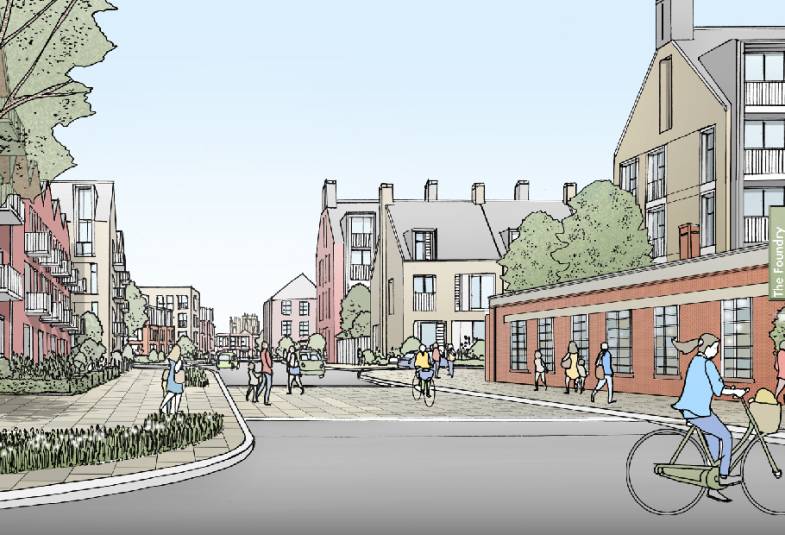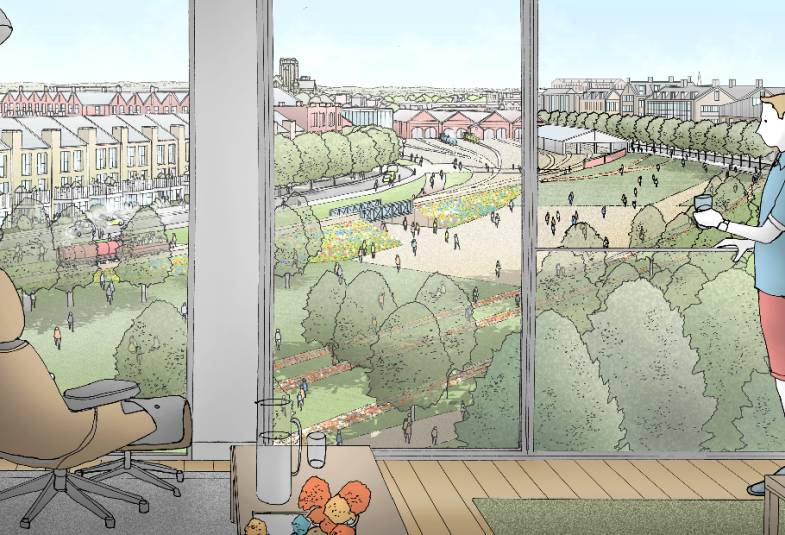15/10/2020
This blog is written by a member of the independent Commission. These views do not necessarily represent the views of the Archbishops' or the Church of England.

Planning permission shouldn’t be about yes or no. 57% of people support building new houses in their area, but how it happens requires discussion. Unfortunately, people often entrench themselves in camps and can’t move from it. The Archbishop of Canterbury’s Housing Commission wants to encourage churches to engage proactively with the planning system. By prioritising the common good, churches have been able to bring those with polarised views together to secure change.
The York Central development is one of the largest regeneration sites in England. The site is 45 hectares, and it’s going to unlock badly needed housing and employment opportunities. Until recently, though, development had been stalled for three decades. It’s a difficult site, surrounded by railway lines and with conflicting local interests – redevelopment would mean the loss of community spaces, while some residents will be displaced.
In 2016, the Right Revd Viv Faull, then Dean of York, was appointed as the chair of a Community Forum to steer the planning of the ‘masterplan’ for York Central. She saw that it was ‘burningly obvious’ that the scheme couldn’t be further delayed. She was told by naysayers that ‘no-one has been able to solve this’ for thirty years and that she wouldn’t do any better.
Viv quickly set about bringing people together. This was difficult. It was critical to include volunteers from community groups – especially those who were opposed to the scheme – alongside councillors and representatives from organisations in the city. The idea was to involve people in the creation of the plan, rather than having to rewrite it through objections, delaying it further. By staying neutral on the scheme itself, Viv was able to bring all these people together.
The forum discussed crucial aspects of the scheme: what facilities were required, how much social housing should be built, and whether the area should be car-free. There were raised voices at times, and part of Viv’s role was pastoral support, particularly for council officers.

Nonetheless, by the time Viv left York, the community forum had made decisions on key areas, and the planning application was being finalised. Because people’s concerns had been heard and taken on board, the masterplan was given approval in March 2019. 2,500 new homes will be built, and an estimated £1.16 billion will be brought to York’s economy.
Viv argues that the church ‘has to have earned that role’. She was invited to lead the forum because she’d already shown an interest in the issues facing the city. The minster also had ‘clout’ because of the work it was doing in the city, including considerable redevelopment around the minster itself.
How can your church get involved?
Not every church can be involved in a large development, but they can make a real difference to their local area. As Viv explained, as a church proves itself as a helpful voice advocating for the community, it gains more trust. Why not encourage representatives from your church to meet with local councillors or take part in a residents’ association or neighbourhood forum? Keep on top of the issues facing your area and any plans for new housing. The church’s prophetic voice could transform your community for the better. If we stand up for the common good and give a voice to the marginalised, who knows what it could enable?
Notes
- The York Central development is being brought forward by a collaborative partnership between Homes England, Network Rail, the City of York Council and the National Railway Museum.
- The Community Forum was started in 2016. Viv Faull (the then Dean of York) was asked by the local authority to chair it.
- York had used community fora previously and found them helpful. The council officer facilitating York Central’s forum had experience with the setup.
- The meetings had up to forty attendees, and a lot of work was put into planning them.
- Viv’s work revolved around inviting the right people to the group, facilitating and moderating the meetings, and providing pastoral support to members of the forum.
- Viv left York in June 2018 to become the Bishop of Bristol, just as the planning application was being finalised. Planning permission was granted in March 2019.
- Although some issues affected the Minster, Viv was careful to stay out of these to maintain her neutrality.
- As Viv explained, the first thing is to build the relationships with those in power. Ask to meet with them, tell them about your church, and let them tell you about them. There are some great resources on this from the Joint Public Issues Team’s ‘Meet Your MP’ campaign.